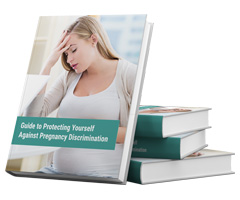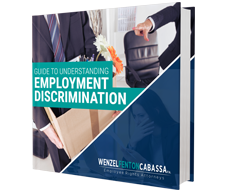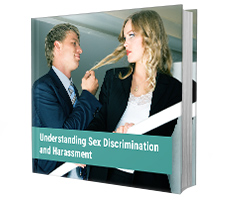
8 Most Significant Employment Law Cases of 2015 Recap
2015 Employment Law Cases that Reshaped Labor Standards and Employee Rights
The most important cases of 2015 changed the way employment law is practiced. Take a closer look at the top debates of this year to get up to date information on employee rights.
Over the past year, many employment law cases have reshaped the way regulations are interpreted and now act as guiding examples of how legal experts, attorneys, and judges interpret the law.
What were some of the most significant employment cases of 2015?
-
-
Young v. UPS
-
This case examined the proper interpretation of the Pregnancy Discrimination Act (PDA) of 1978, which was adopted to mend the previous definition of gender discrimination and more importantly pregnancy outlined by Title VII of the Civil Rights Act set forth in 1964.
The second clause of this act states that women affected by pregnancy must be treated, “the same for all employment-related purposes…as other persons not so affected but similar in their ability or inability to work.” The PDA does not address the need for workplace accommodations during pregnancy but instead bans sex bias discrimination for “pregnancy, childbirth or related medical conditions”, and that while pregnant, women must be treated as others who may be, “similar in their ability or inability to work.” UPS argued in an October 24th brief that the PDA doesn’t require special treatment for pregnant workers, thus accommodating these lifting restrictions during pregnancy would be outside the clause that states pregnancy must be treated the same as other workers with similar lifting restrictions that are the result of off-the-job injury or condition.
The Court explained that such discrimination may exist if the plaintiff (Ms. Young) can show, “sufficient evidence that the employer’s policies impose a significant burden on pregnant workers, and that the employer’s ‘legitimate, nondiscriminatory’ reasons are not sufficiently strong to justify the burden, but rather—when considered along with the burden imposed—give rise to an inference of intentional discrimination.” The Court sent the case back to the Court of Appeals (4th Circuit) to reevaluate the framework based on this 6-3 decision.
Dealing with Pregnancy Discrimination at Work?
Get a copy of our pregnancy discrimination guide & know your rights.
DOWNLOAD NOW
-
-
Department of Homeland Security v. MacLean
-
This case examined the protections of employees in a federal whistleblower case.
MacLean worked as an air marshal for the Transportation Security Administration (TSA) in Las Vegas. In his contract, TSA regulations prohibit the unauthorized disclosure of “sensitive security information” to include information about air marshal assignments. Despite this fact, in July 2003 MacLean disclosed an advisory and additional details about a potential hijacking scheme that was relayed to all air marshals. Shortly after the advisory was set in place, the TSA cancelled all overnight shifts for air marshals on flights from Las Vegas to save money on the cost of hotels. MacLean believed this cancellation was illegal and dangerous, so he contacted the media and disclosed the cancelled overnight shifts and hijacking advisory.
MacLean was then terminated from employment, but he challenged his termination under federal whistleblower protection laws. The Court found that the TSA regulation does not qualify for a basis of exception, and MacLean’s disclosure was protected in a 7-2 decision.
Were you retaliated against at work?
Our retaliation guide will help you learn your rights & how to fight back.
GET THE GUIDE
-
-
Perez v. Mortgage Bankers Association
-
This case addressed the legal restrictions and qualifications regarding overtime exemption for employees who are mortgage brokers under the Fair Labor Standards Act (FLSA).
The question is whether the title of “mortgage broker” can be considered an “administrative” role, thus exempt from overtime pay. The Department of Labor (DOL) issued letters both in 1999 and 2001 stating that mortgage brokers do not qualify for this category of overtime exemption. After the DOL set new regulations in 2004, the Mortgage Brokers Association (MBA) requested the former interpretation be reviewed. The DOL stated in the new opinion that mortgage brokers do qualify for exemption but yet again reversed this decision in 2010 with a letter stating mortgage brokers do not qualify for exemption.
Because there was no opportunity for comment or “notice-and-comment” procedures were not properly taken upon publication of the letters, these DOL statements were considered “interpretive” rules in contrast to “legislative” rules. The Court held in a 9-0 decision that an agency is not required to use “notice-and-comment” procedures to issue an interpretive rule, as the Administrative Procedures Act (APA) clearly states that the proposal and amendment of interpretive rules is exempt from “notice-and-comment” restrictions.
Questions about Overtime, Minimum Wage & Unpaid Wages?
Get the answers you’re looking for with our FLSA guide.
GET YOUR COPY
-
-
M&G Polymers USA, LLC v. Tackett
-
This case examined the true interpretation of a collective-bargaining agreement that pertained to retirees’ healthcare benefits for surviving spouses and dependents.
The former employees, now retired, argued that this provision granted them a vested right to lifetime contribution-free health care benefits despite the fact that the contract itself expired in 2000. The company argued against the vested right stating retirees must contribute to the cost of the benefit. The Court explained that there is no current presumption in favor of the vesting of retiree benefits.
The Court held in a 9-0 ruling that, “[w]hen a contract is silent as to the duration of retiree benefits, a court may not infer that the parties intended benefits to vest for life,” and, “retiree health care benefits are not a form of deferred compensation.” The case was sent back to the Court of Appeals (6th Circuit) for interpretation of the contract with the new standard set forth.
-
-
EEOC v. Abercrombie & Fitch Stores, Inc.
-
This case addressed the issue of whether or not Title VII of the Civil Rights Act addressing religious discrimination in the workplace requires that the employer be informed of the employee/employment candidate’s need for religious accommodation.
Samantha Elauf applied for a position at Abercrombie & Fitch. Elauf is a practicing Muslim and wore a headscarf to her interview. She did not indicate that she would need religious accommodation and the assistant manager deemed her “qualified for hire”. The assistant manager was concerned about the “Look Policy” set forth by the company and consulted her supervisors on the issue of whether or not the headscarf was used for religious purposes. The “Look Policy” prohibits employees from wearing caps. The district manager stated that her headscarf would violate the “Look Policy” and told the assistant manager not to hire Elauf.
The Court determined that even though Elauf had not requested accommodation, Abercrombie & Fitch were still liable for religious discrimination if the presumed need for accommodation was the motivation behind the decision not to hire. The Court held 9-0 that this prohibition applies if the applicant can show that the need for accommodation was a motivating factor in the decision not to hire, even if the employer had no knowledge of the need, as Title VII does not impose a knowledge requirement. The Court also stated, “An employer may not make an applicant’s religious practice, confirmed or otherwise, a factor in employment decisions.”
Were you the victim of employment discrimination?
Know your rights & get the help you need with our guide.
DOWNLOAD THE GUIDE
-
-
Mach Mining v. EEOC
-
This case examined the proper procedure for conciliation for a proposed case of gender discrimination as practiced by the Equal Employment Opportunity Commission (EEOC). The question asked was whether the Court can review the EEOC’s conciliation efforts.
An applicant for a position at Mach Mining filed a complaint with the EEOC that claimed she was not hired because of her gender. The EEOC investigated and found reasonable cause to believe that Mach Mining had engaged in unlawful discrimination, and as such, the requirements of the EEOC were to “endeavor to eliminate [the] alleged unlawful employment practice by informal methods of conference, conciliation, and persuasion” by Title VII of the Civil Rights Act of 1964 (Title VII). In addition, the EEOC is ultimately given authority over the decision of whether or not to enter into a settlement or proceed with a lawsuit.
A letter was sent to Mach Mining requesting for the company to participate in informal methods of resolutions and also stated, they would be contacted to begin the conciliation process. The EEOC filed a lawsuit after sending a second letter a year later stating the efforts at conciliation were unsuccessful, and “any further efforts would be futile.” The claim by Mach Machining is that the EEOC had failed to conciliate in good faith, thus could not proceed with the lawsuit.
A prerequisite for a lawsuit involving the EEOC is a statute that requires this organization to engage in the conciliation process. This statute outlines that the EEOC, “must tell the employer about the claim – essentially, what practice has harmed which person or class – and must provide the employer with an opportunity to discuss the matter in an effort to achieve voluntary compliance.” Title VII’s requirements state that the EEOC, “afford the employer a chance to discuss and rectify a specified discriminatory practice – but goes no further,” and that, “judicial review is . . . to verify the EEOC’s say-so – that is, to determine that the EEOC actually, and not just purportedly, tried to conciliate a discrimination charge,” not to determine whether the EEOC acted in “good faith” but to meet the minimum requirements of the statute.
The Court held at 9-0 that courts may review whether the EEOC satisfied the statutory obligation of conciliation before filing a lawsuit. This case was sent back to the Court of Appeals (7th Circuit) to determine if the EEOC had met the minimum requirements of the statute.
Are you experiencing sex discrimination & harassment at work?
Our guide will help you determine if you have a case.
GET YOUR COPY
-
-
NLRB “Joint Employer” Classification Litigation
-
The National Labor Relations Bureau reviewed the definition of joint employer as the result of litigation and strikes attached to franchised businesses.
Around 40,000 franchise businesses, with more than 75,000 locations, are at risk for failure due to higher labor costs under the new joint employer definition. A study estimates the equity value of franchise businesses will drop greatly by one-third to one-half the current figures. The changes are aimed at addressing the issue of McDonald’s USA LLC and McDonald’s franchisees as joint employers. A future date has been set to examine other claims by the general counsel’s office that the proposed companies deemed as “joint employers” violated the rights of workers across the United States by taking action against workers who participated or engaged in nationwide fast-food worker protests for the purpose of bettering employment conditions and wages.
A decision by the NLRB in August relayed at 3-2 that companies are joint employers of workers if both share control over the workers’ terms and conditions of employment. This new interpretation of “joint employees” will be reviewed on January to determine whether the definition will affect these franchised businesses.
-
-
Obergefell v. Hodges
-
This landmark case addressed whether the refusal by a state to allow same-sex couples to marry and/or recognize same-sex marriages lawfully performed in another state violates the Fourteenth Amendment of the U. S. Constitution.
In this case, the Court recognized that states use marriage as the basis for government endowed rights, benefits, and responsibilities. Because of this, the court ruled that “[t]he limitation of marriage to opposite-sex couples may long have seemed natural and just,” however, “its inconsistency with the central meaning of the fundamental right to marry is now manifest. . . If rights were defined by who exercised them in the past, then received practices could serve as their own continued justification and new groups could not invoke rights once denied.” In addition, the Court found that prohibiting same-sex marriage violated the Equal Protection Clause of the Fourteenth Amendment of the U. S. Constitution stating that the marriage laws in question “are in essence unequal.”
The Court ruled 5-4 that such refusal does violate the Fourteenth Amendment, thus securing further legal protections and interpretations regarding same-sex marriage and equal rights for same-sex spouses in the workplace set by labor standards such as FMLA benefits.
Understanding the meaning of the law is the most important part of just practice. The times change, and so have labor laws and employment law standards.
Contact an Employment Law Attorney in Florida
Has your employer violated your rights as an employee? Sometimes the definition of just treatment in the workplace is unclear. Get in touch with an expert employment law attorney at Wenzel Fenton Cabassa, P. A., for more information regarding your case.
SOURCES:
Employment and Labor Cases to Watch 2015
Recent U. S. Supreme Court Employment Law Cases
Please Note: At the time this article was written, the information contained within it was current based on the prevailing law at the time. Laws and precedents are subject to change, so this information may not be up to date. Always speak with a law firm regarding any legal situation to get the most current information available.













